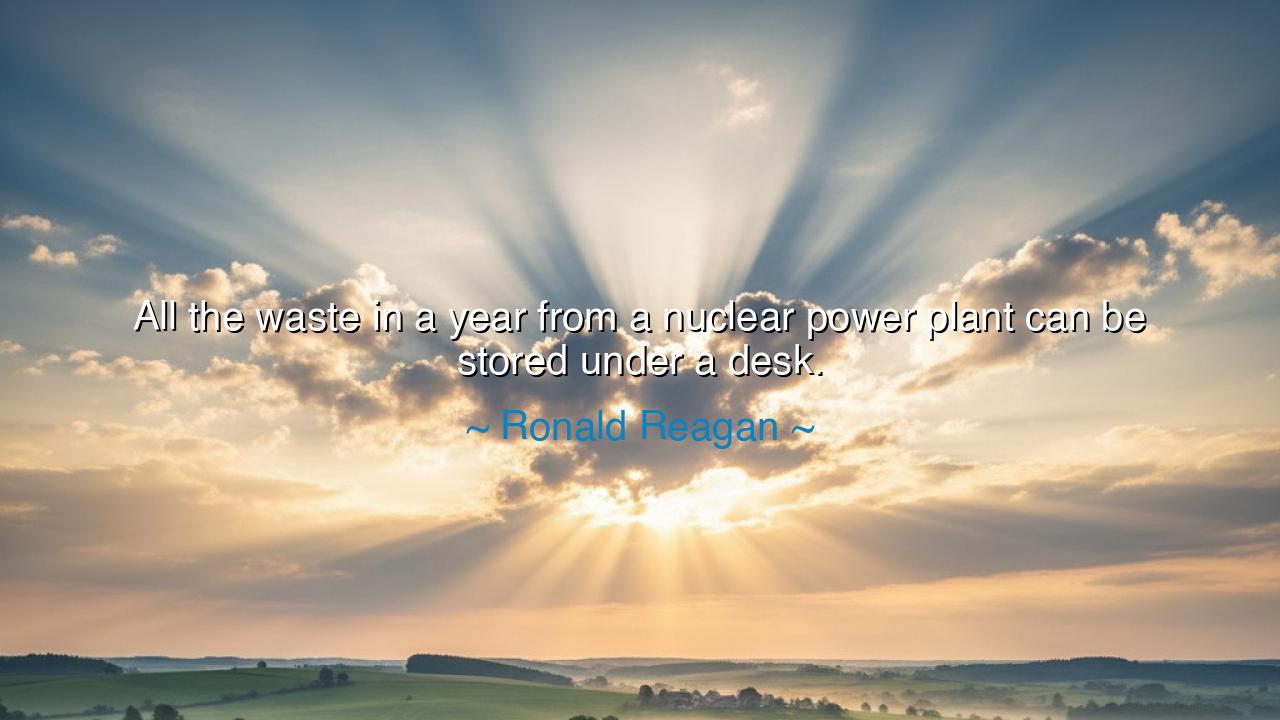
All the waste in a year from a nuclear power plant can be stored






Hearken, O children of insight, to the words of Ronald Reagan, who speaks of the remarkable potential and paradox of nuclear power. He declares that the waste produced by a year’s labor of a nuclear power plant is so compact that it could be stored beneath a single desk. Herein lies a teaching for the ages: the forces harnessed by humankind, though immense, may yield extraordinary efficiency, yet demand both prudence and foresight in their application.
The origin of this reflection is rooted in Reagan’s life as a statesman and communicator, observing the promise and peril of nuclear energy in the modern age. In an era when nations sought sources of power that could sustain industry, society, and progress, he emphasized the surprising efficiency of nuclear energy, while also drawing attention to the concentrated responsibility it imposes. By framing the waste in terms familiar to all—a desk—he rendered abstract danger tangible, illustrating the scale and manageability of this powerful force.
The meaning of this aphorism is profound: great power is often accompanied by concentrated responsibility. Though the energy of the atom holds the capacity to illuminate cities, drive industry, and advance civilization, the waste it produces, though small in volume, contains potent risks. Reagan teaches that human ingenuity must be coupled with wisdom, planning, and respect for the forces we command, for even small quantities carry significance far beyond their size.
History provides vivid testimony to this principle. Consider the Three Mile Island incident in 1979, where a malfunction at a nuclear plant in Pennsylvania highlighted the dangers of human oversight and technical complexity. While the waste produced by the plant was minimal compared to its power, the event demonstrated that even compact and contained energy demands constant vigilance and respect for the consequences of its use. Herein lies Reagan’s wisdom: the magnitude of energy is immense, yet its management requires foresight and care.
Moreover, this teaching extends beyond energy to all domains where human power is concentrated. The architect, the healer, and the engineer all wield forces that, if mismanaged, may yield disproportionate consequences. Reagan reminds us that efficiency does not absolve responsibility, and that the most powerful tools—whether physical, social, or intellectual—demand prudence, ethical consideration, and careful stewardship.
O generations yet unborn, take this counsel into your hearts: marvel at the power humanity can command, recognize the concentrated responsibility it entails, and govern all forces with wisdom and care. For even what seems small—the waste beneath a desk—carries lessons of prudence, foresight, and the enduring challenge of human mastery over nature. Let this understanding guide you as you harness the energies of the world for the prosperity and safety of all.






QQuoc
This quote by Reagan seems to make nuclear waste sound far less significant than many people think. But does it ignore the critical issue of how we store and deal with this waste over decades or centuries? Sure, the volume might be small, but how do we deal with the fact that it remains hazardous for an extremely long time? Shouldn't the focus be on the safe, long-term containment and disposal rather than minimizing the visible footprint?
GDGold D.dragon
Reagan's statement is surprising because it contrasts the common image of nuclear waste as something overwhelmingly dangerous with the idea that it can fit in such a small space. Does this mean that nuclear power isn’t as problematic as we think? Or is it just an oversimplified way to address a much larger issue? How does the reality of radioactive waste—its toxicity, the potential for leaks, and its long-term storage—compare to this optimistic take?
HCTRinh Hoang Chien
I find this quote both fascinating and troubling. On one hand, Reagan points out that nuclear waste doesn’t take up much space physically, but on the other, it ignores the complex issue of managing its dangerous properties over time. Is the main point to shift public perception by focusing on the small scale, or is there an underlying message about the safety and security of nuclear energy that might be too simplistic?
LNLinh Nguyen
Reagan's quote seems to make nuclear waste seem less concerning by emphasizing its small volume, but isn’t that a bit of a misleading perspective? While the amount of waste might not take up much space, the radioactive materials have a half-life of thousands of years. How does that fit into this argument? Shouldn’t we be more focused on the long-term risks, rather than minimizing the issue through a small visual comparison?
UGUser Google
This quote by Reagan seems to downplay the scale of nuclear waste, suggesting that it's easily manageable. But how true is that when considering the long-term storage and potential dangers of radioactive materials? Isn’t it a bit misleading to compare something as serious as nuclear waste to something that could fit under a desk? Should we be more concerned about the environmental and health consequences of storing waste, even if it's physically small in volume?